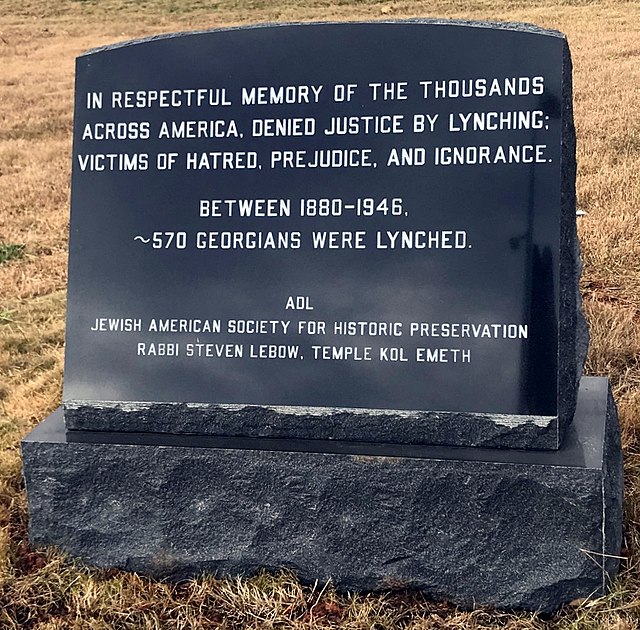Confronting history, Congress studies addition of lynching sites to national park system
Roughly 119 lynchings recorded in all regions of Virginia between 1866 and 1934
The U.S. House is considering a bill that would put lynching sites in western Tennessee on track to become part of the National Park Service, part of a trend this year of Congress using the agency to advance discussions of the nation’s troubled and often violent racial history.
A bill from U.S. Rep. Steve Cohen, a Tennessee Democrat, would require the National Park Service to study the feasibility of adding sites in and around Memphis where white mobs committed lynchings for decades, from just after the Civil War to the Jim Crow era.
Proponents of the bill say understanding an ugly past in which Black people were terrorized and murdered is important.
“Until we remind people of our past, we will not over overcome it, and we will not have a better society,” Cohen said during a July subcommittee hearing on the bill. “We need to recognize the errors in our past.”
Some 119 lynchings have been recorded in all regions of Virginia between 1866 and 1934, according to data collected through James Madison University’s “Racial Terror: Lynchings in Virginia” project. Most of the lynchings were of Black men, although 22 were of White people.
In 2019, the Virginia House of Delegates and Senate passed a resolution “acknowledg[ing] with profound regret the existence and acceptance of lynching within the Commonwealth.”
“The legacy of racism that outlived slavery, enabled the rise and acceptance of lynching, facilitated segregation and disenfranchisement, and denied education and civil rights to African Americans has yet to be uprooted in Virginia, the South, and the nation, and this dark and shameful chapter of American history must be understood, acknowledged, and fully documented and the seemingly irreparable breach mended,” the resolution read in part.
Preserving pieces of history has taken on added importance amid a heated national debate about how the nation’s history of centuries of slavery and oppression of Black people should be taught, Tiffany Patterson, the chair of Vanderbilt University’s African American and diaspora studies program, said in an interview.
“There’s a backlash coming from the political arena and spilling over into parents and teachers and politicians and so on that are terrified of that being really discussed,” she said. “So I think, acknowledging places and making it a kind of museum for teaching purposes for the general public is what’s needed.”
National Park Service recognition may seem purely symbolic, but that doesn’t make it unimportant, said Robert Bland, an assistant professor of history and Africana studies at the University of Tennessee who specializes in the study of race and memory in the United States.
“I think there’s kind of an instinct to say, ‘It’s just symbolic and what about real policy measures?’” he said.
But especially as elements of the political right have mobilized to stifle history that makes some people uncomfortable, symbolic efforts are still important, he said.
“History’s always had propagandistic and kind of myth-making purposes,” he said. “Our history’s often been used to defend, in many cases, white supremacy.”
There is no committee markup — the next step toward enactment — of the Cohen bill scheduled. And Watkins conceded it might be a “multi-year” effort.
But Congress enacted bills with similar missions earlier this year, voting to add a former Japanese internment camp in southeastern Colorado as part of the National Park System and to expand sites related to the Brown v. Board of Education Supreme Court case in Kansas that ended legal school segregation. Under the latter, the Robert Russa Moton High School site in Farmville, Virginia, already a national historic landmark and museum, became an affiliate of the National Park Service.
At the same July hearing where the House Natural Resources National Parks Forests and Public Lands Subcommittee considered the lynching sites bill, members also heard about bills to honor Mexican-American farmworker organizer Cesar Chavez with sites in Arizona and California and John P. Parker, an Ohio conductor on the Underground Railroad who helped slaves escape Kentucky.
Natural Resources Chairman Raúl Grijalva, a Democrat of Arizona, cheered the panel for considering those bills and their focus on history, especially of underrepresented groups.
“There’s been a real effort on the part of this committee—and they should be applauded for that—for beginning to tell the full story of the American experience and American history through our parks, our public lands and our public assets,” Grijalva said at the July subcommittee hearing on the lynching sites bill and others. “That’s a good thing.”
Kym A. Hall, the director of the National Park Service’s capital region, said the agency sought to better reflect the nation’s diversity.
“The goals of this current administration, and certainly of the National Park Service and the secretary of the Interior, are to tell broader stories across the United States, things that may not have been brought forward in our country’s history in a more meaningful way so that a variety of people can connect to those stories,” Hall said at the hearing.
“We have spent the last 10, 20, 30 years of our 100-year organization recognizing that there are many more stories to be told,” she added.
Watkins, the leader of the Memphis project, said NPS involvement was an important piece of national reconciliation.
“With the National Park Service sites, it elevates the stature of those sites,” Watkins said. “This site is recognized as being important on a federal and national level — not just in that neighborhood or that city. It means that we as a nation are starting to come to terms with these wrongs.”
(Virginia Mercury is part of States Newsroom, a network of news bureaus supported by grants and a coalition of donors as a 501c(3) public charity. Virginia Mercury maintains editorial independence. Contact Editor Sarah Vogelsong for questions: info@virginiamercury.com. Follow Virginia Mercury on Facebook and Twitter.)


